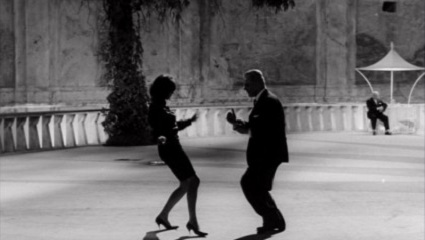
Copyright © 2010 by James Clark
The title of Federico Fellini’s renowned film from 1963 would seem to have in view the full output of his career to that point. Supposedly entailing a crisis of inspiration on his part, the rather disappointing stock number would capture his sense of wading through a series of more or less memorable entertainments. In fact only one of his films, the one directly preceding, namely, La Dolce Vita (1960), is alive on the ground here—in fact, so vitally insistent that it would be virtually impossible to appreciate what the later film is about without having seen the earlier one.
An instance of reprising a moment of La Dolce Vita (one of a plethora of such replays) is the scene at the courtyard bar/restaurant of the posh hotel where the protagonist (“Guido”) is installed in the course of taking a cure at an opulent spa nearby and launching his next film at a site in a desolate expanse, also nearby. A magic act makes up the evening’s theatre, whereby a tall, cadaverous MC stalks amidst the audience, pausing at various tables and thus cueing a blindfolded, elderly woman/clairvoyant to disclose what the guest is thinking. (more…)






















 Click on names for archives
Writers/Founders
Click on names for archives
Writers/Founders